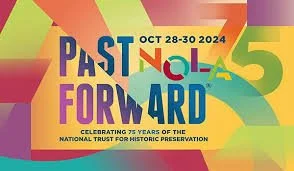
APT-National Trust Joint Conference
The consideration of embodied carbon in tandem with operational carbon is an emerging topic in the retention and conservation of buildings, but do heritage professionals really know how to apply the increasing knowledge on carbon performance to our projects? This full-day workshop aims to take the conversation around embodied carbon beyond the basic introductory concepts, and to look at the total carbon picture so that heritage professionals can position themselves as leaders in climate action. Join co-founder Lori Ferriss for training on applying whole life carbon assessments on heritage and adaptive reuse projects.

Past Forward 2024
Built Buildings Lab co-founder Lori Ferriss will give the closing keynote at this year’s Past Forward conference.
PastForward 2024 will kick off a celebration of the 75th anniversary of the National Trust for Historic Preservation and the evolving practice of preservation in one of the country’s most historic cities.
Joining us will be the Preservation Resource Center of New Orleans celebrating its 50th anniversary, Main Street Louisiana marking its 40th anniversary, and the National Center for Preservation Trades and Technology founded 30 years ago.

Zero Net Carbon Collaboration for Historic and Existing Buildings (ZNCC)
Join Billie and Lori as Built Buildings Lab guest hosts the bi-monthly ZNCC all members meeting.

Northeast Embodied Carbon Summit
This summit will cover the great strides of addressing embodied carbon emissions through advocacy, research, education, outreach, and implementation - nationally and regionally.

AGENCY: The Power of Architects Inside, Beside, and Beyond Practice
When it comes to the design and delivery of the built environment, the power of architects relative to other players and forces has always been contested. Given this uncertainty, the AIANY Future of Practice Committee is convening a day-long symposium focusing on how architects can find agency both through conventional and non-traditional forms of practice. Three moderated panel discussions will focus on working in innovative ways INSIDE, BESIDE, and BEYOND practice and a fourth concluding panel comprised of non-architects will ask the question "why should architects have more agency in the first place?" Ultimately, the discourse aims to shift prevailing conceptions of practice and probe how technical, political, cultural, economic, social, and artistic forms of power can be deployed.